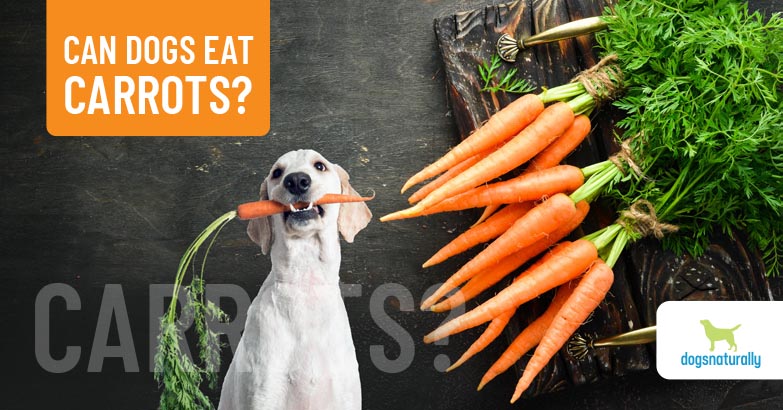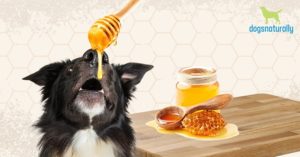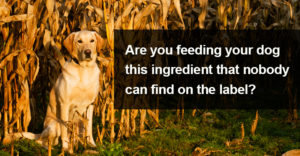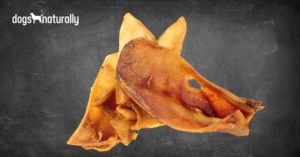You may have heard that chewing on cold or frozen carrots is good for your dog’s teeth. The thought behind this is that they gently scrape the teeth to prevent plaque. But carrots may not be the best chew toy for your dog.
That doesn’t mean you shouldn’t give your dog’s carrots… it just means you should give them to your dog for different reasons. So let’s take a look at why your dog should eat carrots.
3 Reasons Carrots Make A Good Dog Treat
Yes, dogs can eat carrots; this delicious vegetable is full of important vitamins, minerals and nutrients that make them a great choice for your dog. Here are just some of the ways carrots can help your dog stay healthy …
1. Can Improve Digestive Health
Fiber is an important part of your dog’s diet. It helps maintain regularity and improves digestive health. Diets high in fiber are even linked to a reduced risk of colon cancer.
Carrots are rich in both soluble and insoluble fiber. Each of these fibers has its own unique benefits.
Insoluble fiber doesn’t dissolve in water. Instead it draws water into your dog’s intestines to help soften stools. This can be helpful for dogs with constipation. It may also support diabetes by improving insulin sensitivity.
Soluble fiber, like the pectin found in carrots, dissolves in water and creates a gel that …
- Improves digestion
- Firms up stools to reduce diarrhea
- Helps manage blood glucose to reduce the risk of diabetes
Soluble fiber is also prebiotic. They’re fermented by the bacteria in your dog’s gut to help produce short-chain fatty acids that …
- Reduce the number of harmful bacteria in your dog’s gut
- Protect the gut lining to help prevent dysbiosis and leaky gut
- Boost the immune system
- Help the body absorb nutrients
Carrots also contain a good amount of magnesium. This can help improve bowel movements, especially for dogs suffering from constipation.
2. Help Prevent Chronic Disease
Carrots are not only rich in fiber, they’re full of antioxidants, including:
- Beta-carotene
- Lutein
- Lycopene
- Anthocyanins
- Vitamin C
Antioxidants help reduce oxidative stress, which can lead to chronic diseases including …
- Diabetes
- Arthritis
- Premature aging
- Chronic inflammation (which is also linked to many diseases)
- Cancer
Oxidative stress is when your dog has too many free radicals in her body. Free radicals are damaged cells with unpaired electrons. To make themselves whole again, they steal electrons from healthy cells. But this creates a chain reaction and more cells become damaged.
Antioxidants neutralize free radicals and stop them from doing further damage. Your dog produces her own antioxidants but it isn’t always enough to keep the free radicals in check. That is why it’s important to add antioxidant rich foods, like carrots, to your dog’s diet.
3. Improve Eyesight
Some of the antioxidants in carrots, like lutein and beta-carotene, play an important role in eye health. This is because they’re some of the only antioxidants that can accumulate in the retina to protect it from oxidative stress.
Beta-carotene is also provitamin A, which means it converts to vitamin A in your dog’s body. Vitamin A supports eye health and it helps with …
- Healthy skin and coat
- Sun protection
- The formation of bone and teeth
- Protection against infection
- Proper reproduction
RELATED: can dogs see in the dark?
What To Consider Before You Give Your Dog A Carrot
Before you share a carrot with your dog, there are a few cautions you should consider.
- Large chunks of carrot can be a choking hazard. Be sure to cut them up into bite size pieces. (I’ll talk more about how to feed carrots to your dog in the next section.)
- If you do let your dog chew on a frozen carrot, be sure to supervise. If it’s too easy for her to break off large chunks, a bone may be a better choice.
- Carrots have a lot of natural sugars when compared to other vegetables but … they’re also low on the glycemic index. That means moderation is key, especially with diabetic dogs.
- Dogs can get vitamin A toxicity. If you’re feeding your dog a pre-made diet with added vitamin A, don’t add too many vitamin A rich foods like carrots.
How To Feed Carrots To Your Dog?
Carrots can be a nutrient packed addition to your dog’s diet. But for your dog to get the most out of her carrots, you need to make sure they’re properly prepared.
Carrots can be difficult for your dog to digest. (That’s why they usually come out looking the same as when they went in.) To help your dog get the most benefits she can from this root vegetable, you’ll want to cook it first. In fact, one study showed raw carrots released 41% of the beta-carotene. When cooked, this number increases to 65%.
It’s important you don’t overdo it though. Cooking carrots can reduce the nutritional value. Instead, cut the carrot into small pieces and lightly steam them.
In a pinch, you can also grate, puree or mulch the carrots. This won’t be as nutritious as steamed carrots but it will be easier for your dog to digest and help release more nutrients.
If your dog isn’t used to fiber rich foods, introduce carrots slowly. Too much fiber, especially insoluble fiber, can lead to digestive upset.
It’s also important to remember that you should feed carrots in moderation. Carrots are best used as an occasional treat … either as a reward for good behavior or as a tasty meal topper.
Should You Use Carrots As A Chew Toy?
Many people recommend letting your dog chew on frozen carrots to help prevent plaque. Studies haven’t looked into the validity of this, though some researchers have speculated on it.
In humans, studies have found no significant benefit from vigorous chewing of raw carrot or apples on oral health; however, this may be due to the structure and spacing of human teeth. The scissor bite of the dog would be expected to impart greater benefit from vigorous chewing than the human teeth occlusion …
… Chewing mechanically disrupts the accumulating plaque, and is, therefore, a self-cleaning action. Chewing also stimulates flow of saliva, which contains anti-bacterial agents that help clean the mouth.
S Mckenzie (2005)
And I agree, chewing is an important part of your dog’s oral hygiene. But, if you do decide to toss your dog a treat to improve her oral health, a raw bone may be a better choice. The first reason for this is that there are studies to back up their effectiveness …
Chewing raw bovine bones was an effective method of removing dental calculus (tartar) in dogs.
FR Marx (2016)
The second reason is that bones offer added benefits. They help …
- Loosen baby teeth in puppies
- Exercise your dog’s muscles, joints, tendons and ligaments
- Reduce bad behavior related to boredom
- Provide a mental challenge
RELATED: Here’s how to choose the best recreational bone for your dog …
But don’t write off carrots yet …
Carrots are still a good treat for your dog’s teeth … even if they can’t really remove plaque. That’s because carrots contain vitamin A, K and calcium, which all contribute to healthy teeth (and bones).
RELATED: Did you know that raw food can benefit your dog’s oral health?
Feed Your Dog A Rainbow
When you feed your dog fruits and veggies you want to give them as many different colors as possible. That’s because each color of produce provides different nutrients.
Carrots have many benefits, but they aren’t as nutrient dense as other produce. They’re also high in sugar and aren’t as digestible as other foods when served raw.
Fiber And Antioxidants
If you’re looking for fruits and veggies that will give your dog the fiber and antioxidants she needs, try …
- Butternut squash – it has less sugar than but many of the same beneficial nutrients.
- Kale – full of antioxidants including beta-carotene, lutein and vitamin C. Also contains calcium and magnesium.
- Apples – rich in soluble fibers and vitamin C.
- Cranberries – disrupt the formation of plaque. Berries are also rich in antioxidants and great as a frozen treat.
RELATED: 11 reasons to feed your dog fruits and vegetables …
References
Slavin J. Fiber and prebiotics: mechanisms and health benefits. Nutrients. 2013 Apr 22;5(4):1417-35.
Siegel JD, Di Palma JA. Medical treatment of constipation. Clinics Colon and Rectal Surgery. 2005 May;18(2):76-80.
Uttara B, Singh AV, Zamboni P, Mahajan RT. Oxidative stress and neurodegenerative diseases: a review of upstream and downstream antioxidant therapeutic options. Current Neuropharmacology. 2009 Mar;7(1):65-74.
Marx FR, Machado GS, Pezzali JG, Marcolla CS, Kessler AM, Ahlstrøm Ø, Trevizan L. Raw beef bones as chewing items to reduce dental calculus in Beagle dogs. Australian Veterinary Journal. 2016 Jan-Feb;94(1-2):18-23.
Mckenzie S, Brown W, Billingham J, Harris A, Genity PMC. Influence of chewing on dental health in dogs. 2005 May.
Jovanovic-Malinovska R, Kuzmanova S, Winkelhausen E. Oligosaccharide profile in fruits and vegetables as sources of prebiotics and functional foods. International Journal of Food Properties. 2014 Jan 14;17(5):949-65.
Edwards AJ, Nguyen CH, You C, Swanson JE, Emenhiser C, Parker RS. α- and β-carotene from a commercial carrot puree are more bioavailable to humans than from boiled-mashed carrots, as determined using an extrinsic stable isotope reference method. The Journal of Nutrition. 2002 Feb 01;132(2):159-67.
Bonifait L, Grenier D. Cranberry polyphenols: potential benefits for dental caries and periodontal disease. Journal of the Canadian Dental Association. 2010 Oct 01;76(1).
Livny O, Reifen R, Levy I, Madar Z, Faulks R, Southon S, Schwartz B. Beta-carotene bioavailability from differently processed carrot meals in human ileostomy volunteers. European Journal of Nutrition. 2003 Dec;42(6):338-45.












